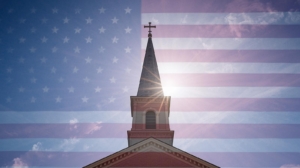I have explained at great length here why those who deny our covenant theology, our hermeneutics, and our doctrine of the sacraments are not Reformed. All the Reformed confessions of the sixteenth and seventeenth centuries teach paedobaptism and denounce the rejection of . . . Continue reading →
Twofold Kingdom
Prayers And Images: A Video That Never Should Have Been Made
On Sunday, my church’s morning worship service opened with a call to worship by an elder and sung congregational praise. Then the pastor offered a prayer of invocation, making it clear who was being worshiped and why the congregation had assembled. At . . . Continue reading →
The American Experiment
I tried not to write anything about the murder of Charlie Kirk. I did not want to add to the noise, but in one of his recent press conference appearances, Spencer Cox, the governor of Utah, used the expression “The American Experiment.” . . . Continue reading →
Twenty Affirmations And Exhortations For Christian Citizens
Just as Christians are not to “grieve as others do who have no hope,” neither are we to rage as those who do not know the one true God. Continue reading →
Was Paul Mean?
I was meditating on Paul’s words in 2 Thessalonians 3:6–12. Paul was concerned about those in the congregation who were obsessed with and confused over Jesus’ return (parousia). They had what theologians (rightly) call an “over realized eschatology.” In their anticipation of . . . Continue reading →
Fisher’s Catechism On Distinction Between The Special And General Kingdoms
James Fisher published a widely-read (and oft-reprinted) Exposition of the Shorter Catechism (1753). Ebenezer Erskine and others of the “Marrow Men”—that is, those who were the gospel-men in eighteenth-century Scotland (as opposed to the moralists of the time)—were also associated with it. . . . Continue reading →
POPLL: An Alternative To Christian Nationalism (And Theonomy, Christian Reconstruction, Theocracy, And Christendom) (Pt 10)
How Lawsuits Work I am not a lawyer nor am I practicing law in this space. What follows should not be construed as legal advice but broadly there are two kinds of court cases: civil and criminal. The latter are tried by . . . Continue reading →
POPLL: An Alternative To Christian Nationalism (And Theonomy, Christian Reconstruction, Theocracy, And Christendom) (Pt 9)
So far in this series we have considered four ways that Christians can engage secular politics in our time, between the ascension and return of Christ: Prayer, Organize, Persuade, Legislate, and Litigate. Certainly the first point, prayer, cannot be controversial, since Scripture . . . Continue reading →
POPLL: An Alternative To Christian Nationalism (And Theonomy, Christian Reconstruction, Theocracy, And Christendom) (Pt 8)
The fourth of our five points of Christian citizenship is Legislate. Last time we considered briefly what it means to legislate, i.e., to draft and pass a law, but how does it happen? How does one become a legislator and how does . . . Continue reading →
POPLL: An Alternative To Christian Nationalism (And Theonomy, Christian Reconstruction, Theocracy, And Christendom) (Pt 7)
One of the great errors of the American Christian Nationalists is that they have given up on the American project before they have actually attempted the act of citizenship. They complain endlessly about the so-called “post-World War II consensus,” which they never . . . Continue reading →
POPLL: An Alternative To Christian Nationalism (And Theonomy, Christian Reconstruction, Theocracy, And Christendom) (Pt 6)
I have been laboring over the middle rubric of the POPLL agenda, namely persuasion, because it is much neglected and yet central to Christian social engagement in a democratic republic like the USA. I am also laboring over it because it is . . . Continue reading →
Strangers, Exiles, And Civil Religion
Since most of us have grown up with the Thanksgiving Holiday, it is easy for us to assume that this is the way things are and should be, but it has not always been so nor is it necessarily so. The American . . . Continue reading →
POPLL: An Alternative To Christian Nationalism (And Theonomy, Christian Reconstruction, Theocracy, And Christendom) (Pt 5)
In this part of the series, we are considering the art of persuasion—that is, convincing our neighbors of views and policies that are for the improvement of the body politic. In order to persuade our neighbors, Christians need to make three distinctions: . . . Continue reading →
Augustine On Christ’s Present Reign
Today is St Augustine’s birthday (354 AD). In honor of his birthday, today’s Heidelquote is by St Augustine. 3. Therefore let the Church of Christ, the city of the great King, full of grace, prolific offspring, let her say what the prophecy . . . Continue reading →
POPLL: An Alternative To Christian Nationalism (And Theonomy, Christian Reconstruction, Theocracy, And Christendom) (Pt 4)
There are five points to the citizenship program for which I have been arguing. The third point is persuasion. Last time we looked at some of the challenges we face in persuading our neighbors to support policies and politics that, “under the . . . Continue reading →
Eric Metaxas Is Wrong
Not everything that Christians do belongs to the visible, institutional church. Christians are free to organize in a variety of ways to accomplish social ends but Christ, the Lord of the Church, has given the visible, institutional church a very specific mandate and becoming a political action committee is not part of the church’s portfolio. Continue reading →
POPLL: An Alternative To Christian Nationalism (And Theonomy, Christian Reconstruction, Theocracy, And Christendom) (Pt 3)
The third and central act of active citizenship is persuasion, i.e., leading (inducing) our neighbors to agree with us about temporal life. Just as we organize for the well being of society, so also we seek, through convincing evidence, clear logic, and . . . Continue reading →
New Resource Page: On The Spirituality Of The Church
The doctrine of the spirituality of the church holds that God has ordained distinct spheres in the Christian life. The family is one sphere of authority and administration. Secular life, i.e., that life that is common to believers and non-believers alike, is . . . Continue reading →
POPLL: An Alternative To Christian Nationalism (And Theonomy, Christian Reconstruction, Theocracy, And Christendom) (Pt 2)
The second stage of active citizenship is organizing. Just as we pray for the well being of society, so also we work for it. This is a more important step than one might think because Christians too often simply assume that the . . . Continue reading →
POPLL: An Alternative To Christian Nationalism (And Theonomy, Christian Reconstruction, Theocracy, And Christendom) (Pt 1)
As part of an essay on the attempt by the U. S. Postal Service to compel a man to violate his religious convictions by forcing him to work on the Christian Sabbath, I offered an alternative to a variety of popular but . . . Continue reading →









